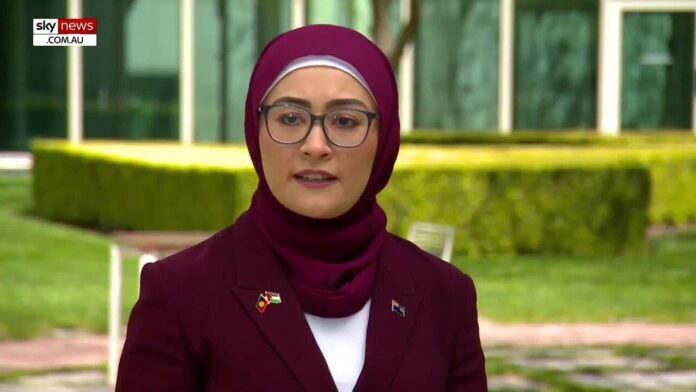Former ALP Senator Fatima Payman established Australia’s Voice, aiming to amplify the concerns of Australians feeling neglected, particularly regarding Gaza and housing policies
In a bold political move, Fatima Payman, a former senator for the Australian Labor Party (ALP), has announced the launch of her new political party, Australia’s Voice. The announcement comes after her departure from the ALP, driven by profound disagreements over its stance on the Gaza conflict and climate change policies. Speaking at a press conference in Perth, Payman articulated her vision for a centrist party dedicated to uplifting the voices of those she believes have been overlooked by traditional political structures.
Australia’s Voice, Payman asserts, will be a party that resonates with the sentiments of “all Australians,” particularly those who feel disenfranchised. “Many have expressed a growing frustration, a sense of being left behind,” she stated. “They feel as if they are shouting into the void, their concerns met with indifference.” This sentiment of urgency has led to the formation of her party, which promises to bring a fresh perspective to Australian politics.
Payman, who represents Western Australia in the Senate, indicated her intention to run candidates in both the Senate and lower house across all states, demonstrating her ambition to establish a significant presence in the upcoming elections. She described Australia’s Voice as a platform designed to reflect the needs of “the disenfranchised and the unheard,” a clear indication that her political philosophy will diverge from the established norms of the ALP and other major parties.
At the heart of Australia’s Voice lies a commitment to addressing pressing issues such as housing affordability, aged care reform, and early childhood education. While the specifics of her policy platform are still being developed, Payman expressed her eagerness to share these details with the public in due course. “We aim to drag the two major parties kicking and screaming to do what needs to be done,” she affirmed, showcasing her determination to challenge the status quo.
Having left the ALP in July, Payman cited a lack of alignment with the party’s legislative agenda as her primary reason for resigning. In her departure statement, she voiced her discontent with the Labor government’s approach to critical issues, particularly its handling of the Gaza situation. “I see no middle ground, and my conscience leaves me no choice,” she remarked, underscoring her conviction to advocate for a more compassionate and inclusive political discourse.
As the media gathered for her announcement, Payman’s passion for change was palpable. She articulated a vision for a political landscape that prioritises the voices of Australians who have felt silenced by the entrenched interests of major parties. “We can no longer sit by while our voices are drowned out by the same old politics,” she declared, framing her new party as a necessary counterpoint to the prevailing political narratives.
Although still in the formative stages, Australia’s Voice aims to unite Australians from diverse backgrounds, urging them to participate in a political conversation that truly represents their needs and aspirations. Payman’s decision to embark on this new journey comes at a time of political flux, as Australians increasingly seek alternatives to traditional party politics.
With her party’s launch, Payman has set the stage for a challenging campaign ahead. She has yet to engage with any crossbenchers, but she is actively exploring her options as she builds her political coalition. Payman’s commitment to grassroots engagement will be crucial in shaping Australia’s Voice into a formidable force in the political arena.
As the public awaits the unveiling of the party’s comprehensive policy platform, Payman’s vision for Australia’s Voice continues to gain traction. Many observers are eager to see how this new political entity will navigate the complexities of Australian politics, especially in light of the ongoing discourse surrounding climate change and international conflicts.
Payman’s announcement is not just a personal milestone but a reflection of a broader discontent with traditional political frameworks. It underscores a significant shift in the Australian political landscape, where the call for new voices and perspectives is becoming increasingly urgent. As the election cycle approaches, Fatima Payman’s Australia’s Voice promises to be a fresh and potentially transformative player in Australian politics, aiming to reclaim the narrative for those who feel unheard.
